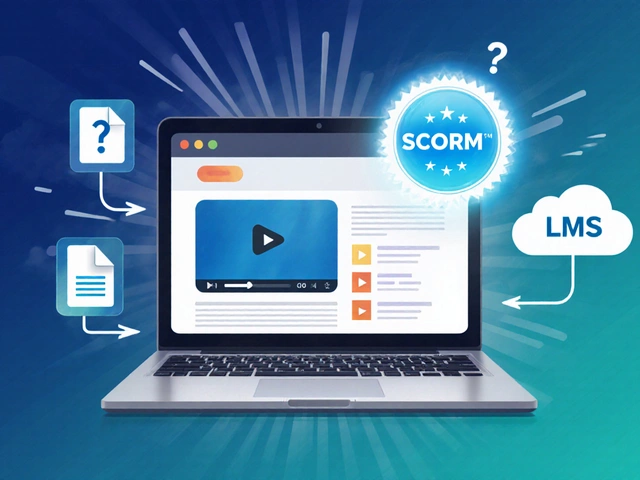
Online Skill ROI Calculator
How profitable is your next skill?
Calculate your expected earnings and time to profitability for the most in-demand online skills based on your current experience and learning commitment.
Your Estimated ROI
Everyone wants to turn a few hours of study into a steady paycheck, but the internet makes it easy to chase trends that fizzle out fast. What really matters is picking a skill that blends high demand, solid pay and a clear learning path. Below you’ll find the data‑driven answer to the question: what is the most profitable online skill to learn, plus a step‑by‑step guide to get started.
Key Takeaways
- Data science, AI/ML, and cloud computing top the list for average annual earnings (US$100K‑150K).
- Digital marketing and cybersecurity offer the fastest ROI - you can start earning within 3‑4 months of focused study.
- All six high‑earning skills can be mastered through affordable online courses; most platforms have free trial periods.
- Choosing the right skill depends on your background, learning style, and the market you aim to serve.
- Avoid "shiny‑object" traps by checking job‑board demand, salary benchmarks and certification credibility.
Why Money Matters More Than Hype
Online learning exploded after 2020, but not every popular course translates into a paycheck. A skill’s profitability hinges on three pillars:
- Market demand - number of open roles and freelance gigs.
- Revenue potential - average salary, hourly rate, or project fee.
- Investment required - time and money needed to become job‑ready.
When you line up these factors, a clear picture emerges: a handful of tech‑focused disciplines dominate the profit charts, while creative fields sit a tier below but still generate respectable income.
Top High‑Earning Online Skills
Below are the eight most profitable skills based on 2024‑2025 salary surveys (Glassdoor, PayScale, LinkedIn) and freelance platform data (Upwork, Fiverr).
Data Science is the discipline of extracting insights from structured and unstructured data using statistics, programming and machine‑learning algorithms. In 2024 the average US salary hovered around $130,000, with senior roles breaking $180,000.
Artificial Intelligence / Machine Learning focuses on building models that can learn from data and make predictions or automate tasks. AI engineers earn between $120K‑150K, and specialist roles in generative AI push $200K+.
Cloud Computing covers designing, deploying and managing services on platforms like AWS, Azure and Google Cloud. Cloud architects command $130K‑160K, while certified admins often start at $95K.
Digital Marketing encompasses SEO, SEM, content strategy, social media advertising and conversion optimization. Proven marketers earn $80K‑120K, with freelancers charging $75‑$150 per hour for high‑ROI campaigns.
Cybersecurity protects networks, applications and data from threats through risk assessments, monitoring and incident response. Cyber analysts start around $85K, while penetration testers and CISSP‑certified experts break $130K.
UI/UX Design focuses on creating intuitive, aesthetically pleasing user interfaces and experiences. Experienced designers earn $90K‑115K; freelance contracts often exceed $100 per hour.
Software Development involves writing, testing and maintaining code for web, mobile or desktop applications. Full‑stack developers average $110K, while specialized roles (e.g., React, Go) can top $150K.
Copywriting & SEO Writing creates sales‑focused content that ranks well in search engines and converts readers. Skilled copywriters earn $70K‑$100K, with high‑ticket freelancers pulling $150‑$250 per hour.
ROI Comparison Table
| Skill | Avg Annual Salary (US$) | Avg Hourly Rate (Freelance) | Typical Learning Curve* | Job Market Demand (monthly postings) |
|---|---|---|---|---|
| Data Science | 130,000 | 85 | 6‑12 months | 8,200 |
| AI / Machine Learning | 145,000 | 95 | 6‑12 months | 6,900 |
| Cloud Computing | 150,000 | 90 | 4‑8 months | 7,400 |
| Digital Marketing | 95,000 | 75 | 2‑4 months | 10,300 |
| Cybersecurity | 120,000 | 80 | 4‑6 months | 5,800 |
| UI/UX Design | 105,000 | 70 | 3‑5 months | 4,200 |
*Learning curve assumes part‑time study (10‑15 hrs/week) and a focus on industry‑standard certifications.
How to Start Learning Each Skill
All the skills above can be launched with a combination of free resources, paid courses, and real‑world projects. Below is a concise action plan that works for most learners.
- Pick a niche - narrow the broad skill to a market segment (e.g., “SQL for e‑commerce” instead of generic data science).
- Get a foundational certificate - most platforms offer a 4‑week bootcamp that ends with a credential (AWS Certified Cloud Practitioner, Google Data Analytics, HubSpot Inbound Marketing, etc.).
- Build a portfolio - complete at least three hands‑on projects (Kaggle dataset analysis, a cloud‑hosted web app, a SEO audit for a local business).
- Showcase on LinkedIn - add the certificate, write a short case‑study post, and request endorsements from peers.
- Start freelancing or apply for entry‑level roles - use platforms like Upwork, Toptal, or local job boards. Set a clear rate based on the ROI table.
Here’s a quick 30‑day starter checklist for the top three tech skills:
- Data Science: Complete “Python for Data Analysis” (Coursera) → 2 Kaggle competitions → Publish a Jupyter notebook on GitHub.
- AI / ML: Finish “Intro to Machine Learning” (Udacity) → Build a simple image classifier with TensorFlow → Write a blog post summarizing results.
- Cloud Computing: Finish “AWS Cloud Practitioner Essentials” (AWS) → Deploy a static website on S3 → Earn the AWS Certified Cloud Practitioner badge.
Common Pitfalls & Pro Tips
Pitfall #1: Chasing the newest buzzword - Skills like “web3 development” can be exciting, but demand is still niche. Stick to proven high‑pay fields unless you already have a network in that space.
Pro Tip: Pair your primary skill with a complementary one (e.g., data science + storytelling) to differentiate yourself.
Pitfall #2: Ignoring soft skills - Communication, client management and project planning raise freelance rates by 20‑30%.
Pro Tip: Enroll in a short “Effective Communication for Tech Professionals” course (often free on edX) alongside your technical training.
Pitfall #3: Under‑pricing early gigs - Starting low can attract low‑budget clients and damage perceived value.
Pro Tip: Use the ROI table to set a minimum hourly rate; even entry‑level freelancers should aim for $40‑$60/hr in tech fields.

Future Outlook - Will These Skills Stay Profitable?
Industry reports from Gartner (2024) predict AI/ML talent shortages will deepen through 2030, while cloud migration projects are slated to exceed $1 trillion worldwide. Digital marketing budgets are growing 12% YoY as e‑commerce expands in emerging markets like Africa and Southeast Asia. Cybersecurity spending alone is expected to hit $210billion by 2027. In short, the six skills highlighted are not short‑term fads.
Next Steps for Different Personas
- Recent graduate: Enroll in a 3‑month bootcamp for data science, finish a capstone project, and apply for analyst roles.
- Mid‑career professional: Upskill with a cloud certification, migrate a small internal app to AWS, and negotiate a raise or remote consulting gigs.
- Freelance creative: Add SEO copywriting to your service list, complete HubSpot’s inbound certification, and charge premium rates for conversion‑focused content.
Frequently Asked Questions
Which skill gives the fastest return on investment?
Digital marketing and cybersecurity typically require 2‑4 months of focused study and can start generating income within weeks of landing the first freelance gig, making them the quickest ROI options.
Do I need a computer science degree to become a data scientist?
No. A well‑structured online curriculum covering Python, statistics, and machine‑learning libraries-plus a solid portfolio-can substitute for a formal degree in most hiring scenarios.
How much should I charge as a freelance AI engineer?
Mid‑level freelancers commonly charge $90‑$120 per hour for model development and deployment. Adjust based on project complexity and your certification level.
Are there scholarships for online cloud certifications?
Yes-AWS, Google Cloud and Microsoft Azure regularly run free‑access weeks, partner with NGOs, and offer discounted vouchers for students from developing countries.
What’s the best way to stay updated after learning a new skill?
Subscribe to industry newsletters (e.g., KDnuggets for data, InfoSec for security), follow top practitioners on Twitter/LinkedIn, and dedicate at least one hour a week to a recent case study or tool update.







